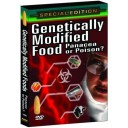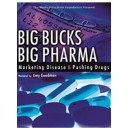The Foods that Make Billions
The Foods that Make Billions is a series looking at how big business feeds us. Starting with a look at the bottled water industry, moving through cereals and finally looking at yoghurt, these three episodes explore the history of how these simple commodities have become staple products, part of the global diet.
Liquid Gold looks at the competitive dynamics between two of the global leaders in the bottled water marketplace: Nestle and Danone. Episode one unpacks the brand philosophy and big business strategy behind these big hitters in the industry. But why would you buy something that you could get for free from the tap? This documentary looks at the marketing and advertising strategies used by big business to create demand that results in the distribution of millions of bottles of water around the world.
Episode two tells the story of a modern marketing miracle: the story of the breakfast cereal. The Age of Plenty investigates the processing, marketing and advertising behind a breakfast that has singularly impacted the way we live. Breakfast cereal marks the birth of modern day "convenience food", invented to make cheap and lifeless corn bits edible and easy to sell, and promoted through reverse psychology, cereal has transformed the way we eat and consequently the way we live. This series tracks the multi-billion dollar breakfast cereal industry, explaining the impact of television advertising on the promotion and sales of breakfast cereals, which endures to this day.
Over the past few decades, yoghurt has hit a stellar trajectory from funny dessert to scientific super food. Marketed as a functional food, yoghurt is the perfect product to satisfy the market's increasing appetite for high nutrition, super healthy foods. Pots of Gold, the final episode in the series, looks at how yoghurt entered the market in the form of a Swiss yoghurt brand which opened up a world of taste to British consumers and etched a space in the market where previously none had existed. "Ski" shows how, by simply adding sugar and fruit, a simple commodity becomes a high-priced necessity. By taking a basic commodity like milk, and manipulating it through processing, packaging and marketing, big business has managed to increase the profit margins of simple products by monumental proportions, resulting in multi-billion dollar industry.
These are the foods that make billions. By employing clever tactics and smart marketing, big business seduces the appetite of the consumer and entices people to spend and spend and spend. This is how global food and beverage empires are built.




I hate bottled water...mostly...but....sort of dumb documentary in a way.... b/c... They didn't say that Perrier is actually good ! It tastes good, comes in a nice glass battle, it's carbonated. It's not tap water. Perrier is a good product. Good for them ! Why don't they mention " they " made a good product. It's not all marketing. But true, people are sheep and corporations are scum and screw bottle water. But I buy Perrier sometimes because it's good. : )
Carbonated water is just water with CO2 added that will leave the water and you very quickly. So you atr taken in just as most are.
I appreciate those with whose effort this documentary was created & their objectivity. It's easy to criticize the greedy ambitions of these global giants but I think some responsibility lies with us consumers too in letting them get away with their designs
A fun study in corporate evolution. Someone help me bring back the noble and humble canteen.
That French i*iot butchered Hippocrates quote "let food be thy medicine, and medicine be thy food."
Just one example why this corps are so ignorant to health. Why eat this processed trash when I can eat WHOLE, REAL food (he says while eating dried figs).
Eventually, I believe the people will become more intelligent about what they eat, and I hope to god—the destructive wake of the industrialization of food—is destroyed itself.
These big businesses are creating foods that are bad for people and our planet. Shame on them and their greed.
What an interesting series. I enjoyed the first segment, about the bottled water industries, the most. Despite our recycling programs here in Ontario, there are plastic water bottles littering the outdoors everywhere I go (and too many paper Tim Hortin's cups to count).
i second that. It was indeed an interesting series. But to talk about the second part, i don't think wheat and corn is essential in any diet (unless you have nothing else). And about the third part, it's hard to find yoghurt that hasn't got any additives these days. Try to find some without sugar. It's baffling.
Agreed. I think people are getting so fat from all those grains and starch. Mind you, in Grandma's days, every one ate that stuff and was very lean. Must have been due to way less additives and chemicals that nowadays find their way into everything. I rarely eat carbs, myself. (I am lean)
I knew an old Lebanese woman who always made her own yogurt from milk and kept it in her fridge all the time. I'll bet there are recipes online:)
Get a Eurocuisine yogurt maker. I was sick of the American yogurt, always too sweet with added sugar, so I decided to make my own. It also saves money in that you essentially can make about 7 jars of yogurt from one cup plus some milk.
...brillant study in manipulation of human mind
Why people would buy bottled water has always been beyond my comprehension when you can easily get the same thing out of your tap. You can even get a reverse osmosis filter for your home for as little as $200.00, and now with the problem of plastic bottles littering the oceans and the world, I can see so no excuse to ever buy bottled water.
well....when u cant afford a filter the more than a $100 and working all the time and focused on other things maybe u should find something cheaper than reverse osmosis but nevertheless u buy a filter. here's were it gets difficult if unemployed cant afford to go back to school because finaid wont accept you, and cant quality for food stamps, or unemployment insurance then u tell want to do. TELL ME but im not looking for sympathy im looking to figure what to do in my life with no money, stuck at home and struggling to find work so i can move out. but i would love to buy a osmosis filter though but at the moment i cant.
If your tap water is drinkable, then you don't have to worry about buying that filter.
Finding that illusive job is definitely a priority. Best wishes.
america flourides their drinking water....a crime in 'its self.'
Probably the culprit behind my muddled brain and terrible forgetfulness, lol? Oh well, at least I have great teeth:)
heart breaking.....wish all your hopes & dreams come true!
Actually, i don't see why one needs to drink 'pure' water. I rarely do.
This was broadcast in the UK and called "the men who made us spend". Just saying.
incorrect, the men who... series has that guy with the lissp
naive people would like to see this under 'conspiracy'.
spell naive backwards and voila...expensive bottled water!
well spotted,sir!